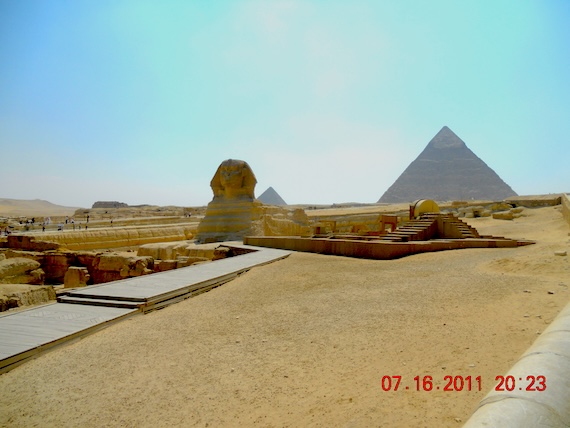Ann Arbor (Informed Comment) – The persistent myth-making of Israelis about history has become a geopolitical danger, no less than the myth-making of Christian Zionists like current US ambassador to Israel Mike Huckabee. Israeli Prime Minister Benjamin Netanyahu alleges that the Muslim jurist or mufti, Amin al-Husseini, put Hitler up to the Holocaust, probably the most inflammatory piece of Islamophobia out there, and a complete lie.
One of the false allegations about history that won’t seem to die is that Jewish slave labor built the pyramids of Giza, which are in the news because of the magnificent new Egyptian museum built near to them. It is an allegation made prominently by Israeli Prime Minister Menahem Begin in 1977, much to the chagrin of his negotiating partner, Egyptian President Anwar El Sadat.
Egypt Independent reports that Magdy Shaker, a senior archaeologist at the Ministry of Tourism and Antiquities, “criticized statements made by Israeli journalist Eddy Cohen regarding Israel’s involvement in the construction of the pyramids.” Shaker asked, “How can anyone claim to have participated in building a monumental structure like the Pyramid of Khufu when they hadn’t even existed yet?”
Hebrews or “Jews” did not help build the pyramids because there were not yet any Jews at that time. The three Giza pyramids were constructed during the 4th Dynasty (c. 2575–c. 2465 BCE). Moses was a mythical figure imagined by Jewish scribes in Achaemenid Iran in the 500s BCE and after, based on circulating folk tales of a branch of the Canaanites, and it isn’t clear whether he really existed or when. If as tradition holds, his dates were 1391–1271 BCE, that was some 11 centuries after the pyramids were built.

Or by check:
Juan Cole
P. O. Box 4218,
Ann Arbor, MI 48104-2548
USA
(Remember, make the checks out to “Juan Cole” or they can’t be cashed)
Archeologists don’t find evidence in Palestine of what we think of as typical Jewish practices like avoiding pork and certain seafood or avoiding the worship of multiple gods until as late as the 200s BCE, however, so when exactly there started being identifiable Jews, as opposed to a branch of the Canaanites who had a special devotion to one of the old Canaanite deities, is also not clear.
Not only did Jewish slaves not build the pyramids, but it now seems clear that the workers weren’t slaves at all. As Natalie Martin, writes, “The latest findings point to a core workforce of around 10,000 skilled labourers and seasonal crews, many of whom were well-fed, housed nearby in temporary cities, and rotated through shifts.”
We have long known that workmen were well housed and well fed, with rations of meat and beer, though manual laborers probably got occasional tough, lean goat rather than sirloin steaks. Recent discoveries of inscriptions at the pyramids name workers’ crews and refer to overseers and craftsmen, Ms. Martin explains. The inscriptions give further proof of a hierarchical and well-organized workforce. Crews came from many provinces of the Fourth Dynasty empire, and probably rotated. Giza was at that time on a now-vanished branch of the Nile and so was a bustling port.
Some of the workers or overseers have their own tombs in the area, and as the dean of Egyptologists Zaki Hawas points out, slaves didn’t get to have tombs in ancient Egypt.
Never miss an issue of Informed Comment: Click here to subscribe to our email newsletter! Social media will pretend to let you subscribe but then use algorithms to suppress the postings and show you their ads instead. And please, if you see an essay you like, paste it into an email and share with friends.
If you want the long version, see Mark Lehner’s chapter, starting p. 397, in this book on labor in the ancient world.
Interestingly, Lehner speculates that there may have been some foreign craftsmen working on the pyramids, not as slaves but as workers with special skills like working with granite or copper. The Phoenician city-state of Byblos may have been one source of such expertise. Nubians from Upper Egypt and Libyans may have been involved, as well. Although they were primarily an Egyptian project, they may have had some minor input from several of the peoples of the region at the time, and so had a cosmopolitan aspect right from the beginning.

“Sphinx and Pyramids of Giza,” © Juan Cole, 2011.
As for Israelites, there is no archeological evidence of them being in Egypt, much less being enslaved. The events of Exodus are often nowadays attributed to the reign of Ramses II [Ramesses II] (r. 1279 to 1213 BCE), but there is a big stele in Luxor detailing the events of his reign, which I once visited, and it does not mention anything about Hebrew slaves or a slave revolt or chasing them to the Red Sea, and Ramses II didn’t drown in its waters. Ramses II lived to 90 and died in his bed. His mummy shows that he had some dental problems, arthritis and hardening of the arteries.
History, like everything else in today’s world, is political, and historical falsities are often deployed for the purposes of uniting people behind grievances or claiming an ancient glory that makes people feel good about themselves today. These things are irrational and should be resisted by reasoning human beings. People don’t get glory from their ancestors, they get glory by behaving like caring, ethical, creative, giving human beings in the present. And nursing old grievances from thousands of years ago is just creepy, especially if they are based on events for which there is no archeological or scientific evidence.


 © 2026 All Rights Reserved
© 2026 All Rights Reserved